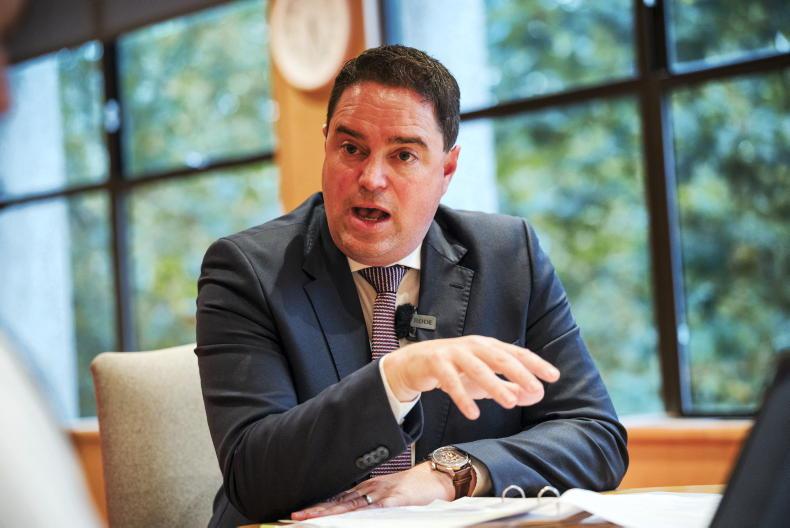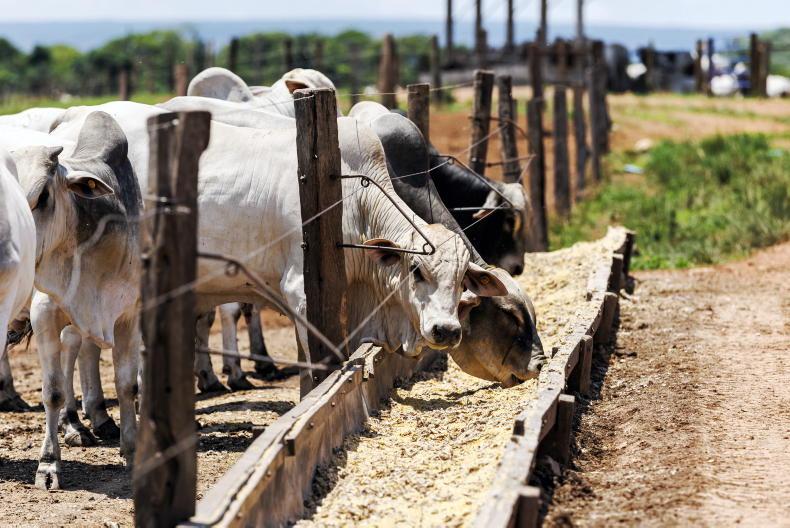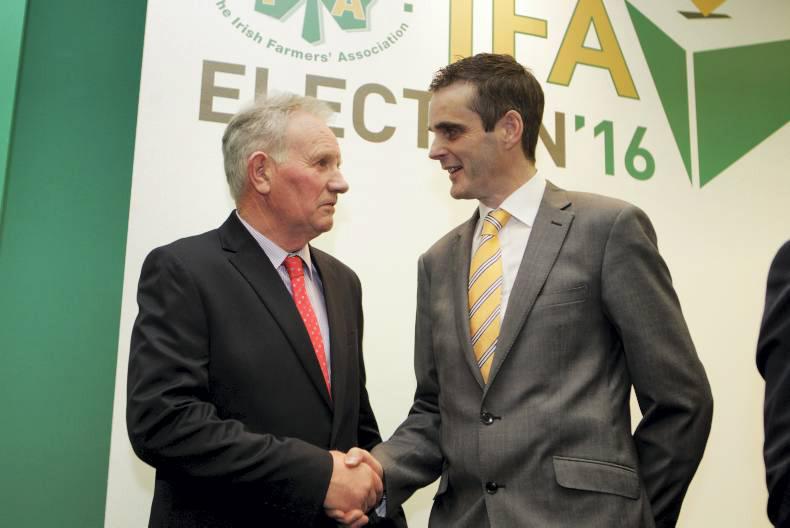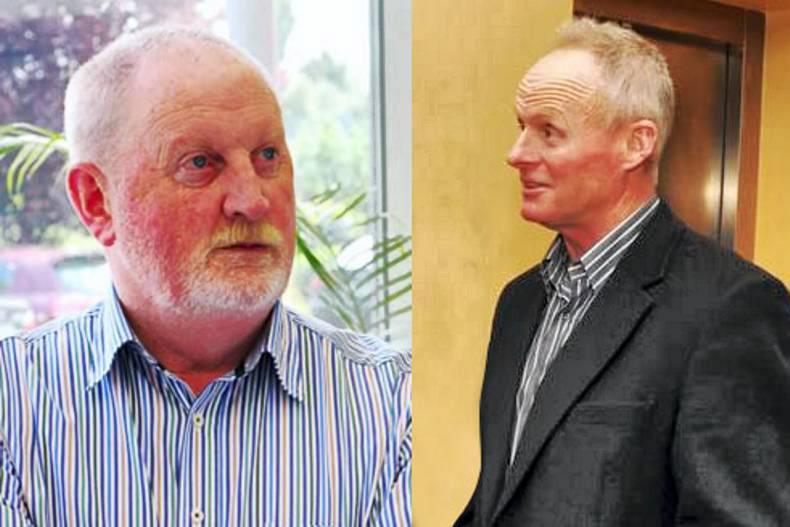Henry Burns, Joe Healy and Flor McCarthy set out their stall for the first time on what will be a marathon road to the IFA presidency for one of them. After all the revelations and shockwaves of the last three months, and all the resignations and recriminations, there was little spark in a meeting that lasted over three hours.
A large crowd, estimated at 400, gathered in the Racket Hall in Roscrea for the North Tipperary executive’s chance to hear the candidates.
Joe Healy said this was "extraordinary election brought by extraordinary circumstances". He added that structural failure had led the IFA into its recent troubles, and that reform was needed.
Henry Burns spoke of the need for members to take ownership of their organisation “It’s not the IFA, it’s our IFA,“ he said.
Flor McCarthy said that he had delivered as rural development chairman, and would again if elected president.
No clash
There was no real clash between any two of the candidates, as they delivered fairly conventional answers to routine questions surrounding farm incomes.
The issue of pay levels within IFA was raised, but there was little discernible anger in the room. It was the first night of 29 planned head-to-heads, so things are bound to spice up as the candidates tackle each other’s policy positions, but for those who came for fireworks there was little entertainment.
For those who came to choose a president, there are three live contenders in what looks promising to be a tight race.
Earlier, Pat Farrell, Richard Kennedy and Nigel Renaghan put forward their claims to the deputy presidency.
Read more from the evening's debate in our archived live blog below.
11.06pm
It's a wrap! In their concluding remarks, Flor McCarthy insists on his track record of delivery.
Joe Healy says that while he was not on the IFA executive council in recent years, he has experience leading farming organisations elsewhere.
And Henry Burns concludes the proceedings saying he "put his heart and soul" in IFA work. "I believe in the symbol of the IFA: Unity, strnegth, delivery," he says, the only man standing up to mark his final words.
Watch this space for a summary of the evening in a few minutes and join us tomorrow at 8pm for the second IFA election debate in West Cork.
10.49pm
A member of the audience asks the candidates if they would make the maintenance of rural roads their priority.
Healy says he is committed to this, because while motorways have improved connections between cities, " there is a lot of the country not living in cities" and "produce and value travel on rural roads".
McCarthy promises the backing of the IFA, but says this is primarily a local issue best addressed by members directly with their constituency TDs.
Burns says this is already part of the IFA election manifesto, which demonstrates this is a priority for him.
The room is restless, people are tired at this stage- we're two and a half hours in at this stage-that would be a long movie
— Farmers Journal (@farmersjournal) February 8, 2016
10.43pm
In reply to a question from the floor as to whether the Con Lucey review of IFA governance went far enough, all candidates agree that more issues need to be examined to reform the organisation.
Healy has the most specific answer, saying that he has heard members refuse to draw a line under the latest revelations and know more about the people who were on high salaries in the past. "As president, I will do what the members want: if there is an appetite to go back and put it all out, that's what will happen. You have my commitment," Healy said.
10.31pm
Asked about the next general secretary of the IFA, all presidential candidates agree the new person's salary should be aligned with that of the general secretary of the Department of agriculture. Joe
10.31pm
Asked about the next general secretary of the IFA, all presidential candidates agree the new person's salary should be aligned with that of the general secretary of the Department of agriculture. Joe Healy is the only one naming a figure, "between €180,000 and €190,000" annually.
Flor McCarthy adds that the person should be on a four-year fixed-term contract.
Burns says "the hiring is just as important as the salary" and this should be done with independent advice.
They all insist on the need to employ the best possible candidate and pay a commensurate salary, but in a transparent way.
10.20pm
Healy says it is a disgrace that some grain farmers feel they are not represented by the organisation they pay fees to and he has already met with so-called splinter groups. On levies, he says this is not a new issue but has been one since he joined 30 years ago.
10.17pm
McCarthy says he would "review" the levy system if elected president.
10.14pm
Burns replies that the answer lies in greater power for commodity commodities. "This is the democratic way," he says. McCarthy, too, proposes that the president refers more often to the commoditie committees.
10.12pm
First expression of anger from the floor from a tillage farmer who says it is the first time he has heard his sector mentioned by the IFA. He complains of the "ineptitude" of IFA management in recent times and of the way former general secretary Pat Smith used to "talk down" to farmers.
10.02pm
McCarthy acknowledges rural crime as "a huge issue in North Tipperary". He concludes by saying that he has experience having served as county chairman and on commodity committees and will "come to this position with a plan to deliver for all farmers".
10.00pm
McCarthy describes inspections as "a massive issue". He says the yellow card system proposed by the European Commission does not go far enough and highlights that many violations detected during inspections are caused by insufficient income in the first place.
9.55pm
McCarthy says that we "need a €20/ewe payment" and highlights the plight of tillage farmers selling grain at below the cost of production.
9.52pm
On Beef prices, McCarthy says: "The three big factories are a cartel controlling prices. We don't have enough competition."
If farmers don't receive enough help from the government on this issue, "we must go to the European Commission - we have an Irish commissioner," McCarthy says.
He also wants to see more encouragement for I've exports: "We have to get more cattle out of this country at a sustainable price," he says.
9:48pm
On dairy, McCarthy says: "We are producing a high quality product, but we are selling at world prices - this is not sustainable." He calls on co-ops to move more decisively into high-end products to get a better return for farmers.
9:47pm
McCarthy says the IFA has delivered for farmers in recent years. He mentions older campaigns such as the one on Brazilian beef. More recently, he says he and the rural development committee helped deliver "the second best deal in Europe after Germany" in CAP negotiations. "We are a strong lobby group," he says.
9:44pm
Rural development committee chair Flor McCarthy from Co Kerry is next up. He says: "I am unique in that I have commonage and designated land."
9:43pm
Healy concludes by detailing his experience since joinging Macra 25 years ago, as chairman of Athenry marts, reporting for the Irish Independent and on the IFA farm business committee.
9:40pm
Like Burns earlier, Healy denounces falling incomes in the tillage sector.
9:38pm
Healy goes on to call for more forward contracts with co-ops, more actio from politicians on the Russian ban and fertiliser prices.
9:35pm
On beef prices, Healy says "the grid has to be fundamentally changed" because it is "completely stacked in favour of the factories". In relation to the proposed ABP-Slaney deal, he says he will ask the government to stop it because it "more competition is needed, not less". He adds that a €20/ewe premium should be seen as necessity, not a demand.
9:33pm
While Burns ssaid previously the average farm income was €26,000, Healy says this was actually €24,000. He promises to lobby for better supports, such as the restoration of ANC payments to earlier levels.
9:31pm
Galway man Joe Healy, who sits on the farm business committee, is next. He says "this is an extroardinary election brought by extraordinary circumstances" and promises "structural change", with farm income and commodity prices as top priorities for the organisation.
9:29pm
Burns concludes by saying his experience at the national anEU levels will allow him to "hit the ground running, which is what the IFA needs."
9:28pm
Burns asks why we cannot get loans at 0.5 or 1% as in Germany, if Europe if a "single, open market". "This is a huge issue for farm incomes."
9:26pm
Burns calls on the minister to tackle Larry Goodman's dominance in the beef sector and gets a round of applause.
9:25pm
On low dairy prices, Burns hits out at European Commissioner Phil Hogan and says the intervention price should be raised to "tell the market this cannot continue".
9:23pm
National livestock chairman Henry Burns is first to speak among presidential candidates. He says he often hears members say "The IFA this, the IFA that..." and replies: "Lads, it shouldn't be the IFA, it should be our IFA." He says this the first step to fix the organisation and go back to the feeling: "It's my IFA and it's doing the job for me." This will take "a huge amount of transparency," he says.
9:20pm
Farrell says he wants to finish the job started in reforming the IFA. "Farm income will be my only priority," he adds.
9:10pm
Kennedy ends by saying that he is "here to fix IFA". "Once that's done, we can talk about farm incomes and other problems," he says.
9:08pm
In his concluding remarks, Renaghan says he has a track record of delivery. "If you think you need a margin, I'm your man," he says.
9:06pm
Asked about "splinter groups," Richard Kennedy says the answer is to do a better job because the value of the IFA lies in the fact that it "represents all farmers".
Nigel Renaghan says they are just farmers "frustrated" by the lack of delivery from IFA in recent times.
Pat Farrelll would sit down with them to open a dialogue.
8:57pm
The debate turns to penalties for heavier beef carcases. Pat Farrell cites the Irish Farmers Journal analysis showing that only two cuts ourt of 40 pose a problem, which is "not acceptable" as a reason to penalise whole carcases.
Richard Kennedy says the problem comes from the fact that one company controls too much of the national kill and the government will have to intervene from a competition point of view.
Nigel Renaghan says other solutions could be explored, such as promoting live exports: "Get the calves out as fast as you can," he says.
8:50pm
Richard Kennedy, too, says IFA must centre its attention on farm incomes. "Tackling retailers is a first step," he says, but he also mentions Sunday's protest outside Slaney Food and wider competition concerns as connected to this issue.
8:47pm
Candidates are quizzed on farm incomes. Pat Farrell says the IFA must refocus on lobbying on this issue instead of "selling mobile phones".
Farm incomes - how to improve them. Renaghan says he has improved margins for farmers as poultry chairman but farmers must stand together
— Farmers Journal (@farmersjournal) February 8, 2016
8:42pm
Nigel Renaghan says paperwork means you come home from the farm and "are at work for another three or four hours". "This has to stop." While he recognises the need for inspections, he says their multiplication and repetition is the problem and he will "sort that out".
Candidates for deputy president address the first #IFAelection debate in Roscrea. Live blog: https://t.co/sfnPj0KWe2 pic.twitter.com/1tXobJdeTc
— Farmers Journal (@farmersjournal) February 8, 2016
8:42pm
Pat Farrell, too, says we should get rid of the "fear of inspections" and adds that they should be more uniform from one inspector to the next.
8:38pm
Asked about the Charter of rights, Richard Kennedy says it is welcome but "has not taken away the fear of inspections". He welcomes the new yellow card system for cross-compliance penalties. "We should accept inspections, but not have fear," he says."They should be realistic."
8:30pm
First question from the floor is to ask the candidates "what they have done for the IFA in the past 20 months". Renaghan mentions negotiations with processors and retailers, Pat Farrell says he supported the motion of no confidence in general secretary Pat Smith and Richard Kennedy says he is coming from the outside and had no responsibility at the national level during the recent scandals.
The deputy candidates brochures pic.twitter.com/pfqYJD486o
— Pat O Toole (@potooleifj) February 8, 2016
8:25pm
Renaghan says "what happened was wrong" in reference to Pat Smith's salary, and adds that the Con Lucey report must be implemented. He concludes by going back to the returns obtained by farmers. "Bord Bia, you must come here," he says. "Where is our premium? As Irish farmers I believe we produce a premium product and we must get a premium price for it."
8:22pm
National poultry chairman Nigel Renaghan is the last deputy presidential candidate to speak. He starts by naming his priority as "getting the fair share of what retailers are getting" for farmers.
8:19pm
Limerick man Kennedy adds that although the IFA is "disgraced", many people still love it and he promises to restore its standing.
8:15pm
Next up is Richard Kennedy, also candidate for vice-president. "The only issue in this election is to fix the IFA," he says. He raises the issue of funding for the organisation. While he says channelling money through factory levies has never stopped him from protesting against beef processors, he acknowledges that some farmers have issues with this system.
8:12pm
Farrell pledges to put a cap on executive pay at the IFA. He also says legislation against the domination of retailer is not strong enough. "We know you can't get two for one," he says. "We don't get two bags of fertiliser for the price of one."
8:10pm
Candidate for deputy president Pat Farrell from Co Kildare is first to speak. "For too long, we have been dictated to by the Farm Centre," he says. "This is your IFA."
8:00pm
Candidates are at the Racket Hall in Roscrea and their supporters are busy distributing leaflets.
Live blogging by Thomas Hubert
More debates to follow
Candidates for the two top positions in the IFA are due to address each county executive, with the dates below set until 18 February so far.
The Irish Farmers Journal team will be live-blogging each debate and bring you the candidates’ positions, as well as questions and reactions from ordinary farmers as they develop.
The recommended outline for each debate is a five-minute address by each of the three candidates for deputy president, followed by a question and answer session with the audience.
The three presidential candidates should then get 10 minutes each to speak before taking questions from the floor.
First round of IFA election debates
| North Tipperary | Racket Hall, Roscrea | Mon 8th Feb |
| West Cork | Parkway Hotel, Dunmanway | Tues 9th Feb |
| Cork Central | Oriel Hotel, Ballincollig, Cork | Wed 10th Feb |
| Waterford | Lawlors Hotel, Dungarvan | Thurs 11th Feb |
| North Cork | GAA Complex, Mallow | Mon 15th Feb |
| Kerry | Ballygarry House Hotel, Tralee | Tues 16th Feb |
| Limerick | Woodlands Hotel, Adare | Wed 17th Feb |
| Clare | Auburn Lodge Hotel, Ennis | Thurs 18th Feb |








SHARING OPTIONS